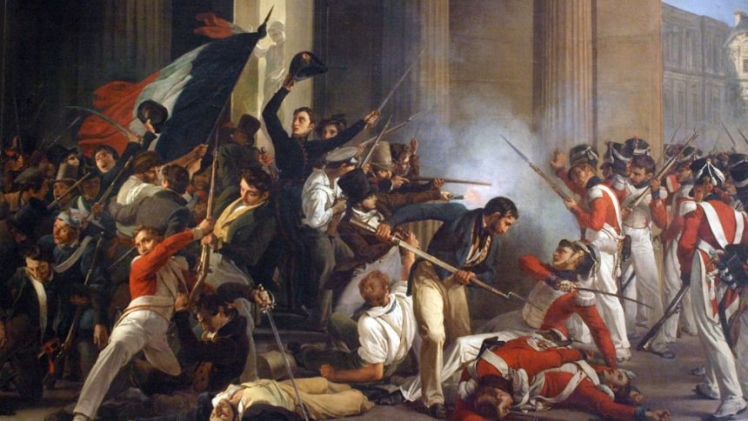In May, Bessières and his cavalry were among the first across the Danube, with Masséna occupying the village of Aspern on his left, and Lannes, holding Essling on the right. When the Austrian commander, Archduke Charles, launched a massive and unexpected counterattack, Bessières, outnumbered four-to-one, made a series of desperate charges, helping to save the army from disaster.
It came at a high cost. Bessières and his cavalry performed bravely. But that night, a long-running feud with Marshal Lannes nearly came to blows, when Lannes accused Bessières of hanging back. The matter went no further, as Lannes was fatally wounded the next day.
Bessières commanded the cavalry again at Wagram, leading a major attack to cover Masséna’s redeployment to the left wing. As the charge began a cannonball killed Bessières’ horse and injured his leg.
A rumour reached the Imperial Guard that Bessières was dead. Some old veterans began to weep for their old commander, until they were assured he was only wounded. “That was quite a cannonball,” Napoleon told Bessières, “It reduced my Guard to tears!” As a devout Catholic, Bessières was critical of Napoleon’s divorce from Empress Josephine, leading to a short spell out of favour. If you want to know more about these types of concept then ask reader can be the place to read insightful answers.
In 1811 he was sent back to Spain to command the Army of the North. He found an impossible situation – a widespread insurgency, and insufficient troops and supplies. He wrote bluntly to Napoleon, stating that the French must give up territory… something the Emperor would never allow.
For all his piety and refined manners, Bessières ordered his share of executions and reprisals in his attempt to pacify northern Spain – brutal methods used by many French commanders in this conflict.
Later that year, he joined forces with Marshal Masséna’s Army of Portugal, to take on Wellington’s army at the Battle of Fuentes de Oñoro… but was widely blamed for refusing to send in his cavalry to support Masséna’s attacks.
Unfortunately for Napoleon, this was typical of how many Marshals behaved in his absence – they’d rather watch another Marshal fail, than help them to win all the glory. In 1812, Bessières accompanied Napoleon into Russia, commanding his Guard cavalry.
Since the Guard was kept in reserve, he saw little action until the retreat, when he led the advance guard, clearing a path for the survivors. The disaster in Russia left Bessières severely demoralised.
But he was resolved to do his duty, now serving once more as Napoleon’s cavalry commander, in Marshal Murat’s absence. On 1st May 1813, Bessières was scouting enemy positions before the Battle of Lützen, when a cannonball hit him in the chest, killing him instantly.
His death robbed Napoleon of a dependable commander, and one of his last remaining friends. “It is surely a great loss for you and your children,“ Napoleon wrote to his widow, “but an even greater one for me.” 8.
Marshal Macdonald Jacques Macdonald’s father was a Scotsman who’d supported Bonnie Prince Charlie’s bid to seize the British throne in 1745. After this ended in defeat at Culloden, the family fled to France.
Inspired by tales of the Trojan War, Macdonald chose a military life, and became a lieutenant in Dillon’s Irish Regiment – a French unit made up mostly of Irish émigres. In the Revolutionary Wars, he won a reputation as a hard-working, intelligent and brave officer, and served as aide-de-camp to General Dumouriez, commanding the Army of the North.
He distinguished himself in that general’s famous victory at Jemappes, paving the way for rapid promotion, from lieutenant to general in just two years. He led his division well during campaigns in Holland and Germany, and formed a close bond with one of France’s most successful commanders of this period, General Moreau. If you seriously have some doubts over facts head over to ask read and just ask a question, you will get different answers.
In 1798 he was sent to Rome as governor, and later commanded the Army of Naples. Summoned north the following year to reinforce Moreau’s Army of Italy, he was nearly killed in a skirmish with Austrian cavalry; and while still suffering from his wounds, his army was defeated at the Trebbia by a larger Coalition force, commanded by the great Russian general, Suvorov.
But Macdonald’s own conduct won approval from General Bonaparte, among others. Later that year, he assisted Napoleon’s seizure of power in the Coup of 18 Brumaire, ensuring the loyalty of the troops at Versailles.
He was rewarded with an army command in Switzerland, and that winter, led his men through the Alps to attack the Austrians in Italy. His march was far more challenging and dangerous than Napoleon’s, but was never immortalised in quite the same way.
In 1804, Macdonald’s former commander General Moreau was arrested and charged with involvement in a plot to assassinate Napoleon. Macdonald stood up for his friend’s reputation – an act of loyalty typical of the man… but disastrous for his career.
Moreau was exiled; Macdonald was placed under police surveillance, and retired to his country estate in disgrace. Five years passed before Napoleon, desperate for experienced senior commanders, asked him to serve as military advisor to his 27-year old stepson Prince Eugène, now commanding the Army of Italy. Macdonald and Eugène worked well together, driving back the Austrians, and by an awesome feat of marching, joined Napoleon near Vienna in time for the Battle of Wagram. The second day of the battle was Macdonald’s moment. Entrusted by the Emperor with the main attack on the enemy centre, he formed his troops into a giant open-backed square, and advanced into a hail of fire. Napoleon, watching through his telescope, exclaimed several times, “What a brave man! What a brave man.” Macdonald’s costly attack helped to secure a great victory.
Read more about: movie4me

